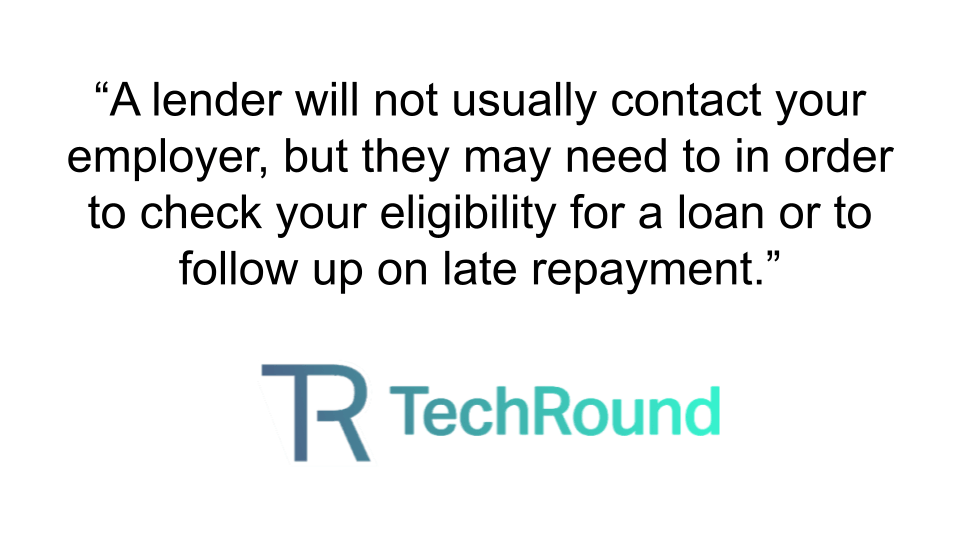Typically, lenders in the UK and the US will not contact your employer when you have just applied for a loan. However, it is sometimes possible as a means of checking your income and eligibility for a loan – or because they are following up on a very late repayment.
Do not worry if a lender does indeed call your employer, it would be handled discreetly and the lender will not explicitly disclose why they are calling. For instance, they may call up the company anonymously and simply just ask if you work there. So you can apply for a loan with peace of mind that a lender certainly won’t be discussing financial products with your boss!
This may vary depending on the product you have applied for or have open, including personal loans, credit cards and mortgages.

Why Would A Lender Need To Contact My Employer?
- To check that you work there and have a regular income coming in
- By having a regular income means that you should be able to cover your loan repayments
- To follow up on any information about yourself before funding your loan
- To follow up on late repayment (after other measures such as phone call and email have been tried)
A lender may get in touch with your place of work whilst fact checking your loan application to confirm your employment as to qualify for a loan you need to have a regular income of at least £500 or £800 per month. So getting through to you on the work phone will prove that you work at the company and therefore are likely to meet this criteria.
Justine Gray from Dollar Hand explained that “it’s important for lenders to confirm that their customers are fully employed so they can be reassured that the borrowers will be able to afford repayments.”
“Let’s not forget that some lenders will be under different regulation or jurisdiction. Some countries or states might be quite relaxed when it comes to checks and some might be very strict, such as the UK’s loans market following increased regulation since 2015. But the laws for heavily regulated regions like New York might be far stricter than places more relaxed and common for consumer credit such as those offering payday loans in Texas.
An additional reason why a lender may contact your employer is to verify the information you have provided. Whilst this would usually be achieved via your personal phone number or email address, if the lender is struggling to get in touch with you then they may try to reach you at work and speak to your employer who can put them through to you.
More from Guides
- 10 Ways Solar Energy Can Reduce AI’s Carbon Footprint
- Can Tech Innovations Help You Trade Specific Commodities Exclusively?
- How Do Shared Solar Projects in The UK Work?
- What is TikTok Lite and How Is It Different From TikTok?
- How To Get Seed Investment
- Tips For Successful Remote Recruitment
- HTTP Vs HTTPS
- How To Start A Business In Portugal In 2024
It is also possible that a lender may need to call your employer if you have defaulted on your loan. If you are failing to meet scheduled repayments and the lender cannot get in touch with you via your personal contact preferences, then they may try calling your workplace to follow up. However, they will only discuss this with you, not your boss or co-workers.
Are There Other Ways For A Lender to Confirm My Employment?
Yes, you can show proof of regular income by sending the lender a copy of your payslip or bank statement. This will show confirmation of your job and give the lender confidence that you will be able to pay back your loan on time. It is however still possible that they may get in touch with your company but it would reduce the chances.
Can I Prevent A Lender From Contacting My Employer?
We understand that not everyone wants to be called at work so there are some strategies you can undertake to reduce the likelihood of your lender contacting your employer.
Making sure you are readily contactable via your personal phone or email address will certainly help to address any issues. Calling an employer is usually a last resort when lenders are unable to get through to borrowers so make sure you answer all messages from them to avoid this.
If you have missed a repayment is it highly advisable to contact your lender immediately to come to an arrangement. Lenders will usually help you to sort an alternative flexible repayment plan, and this will prevent them from reaching out to your workplace to rectify the situation.



